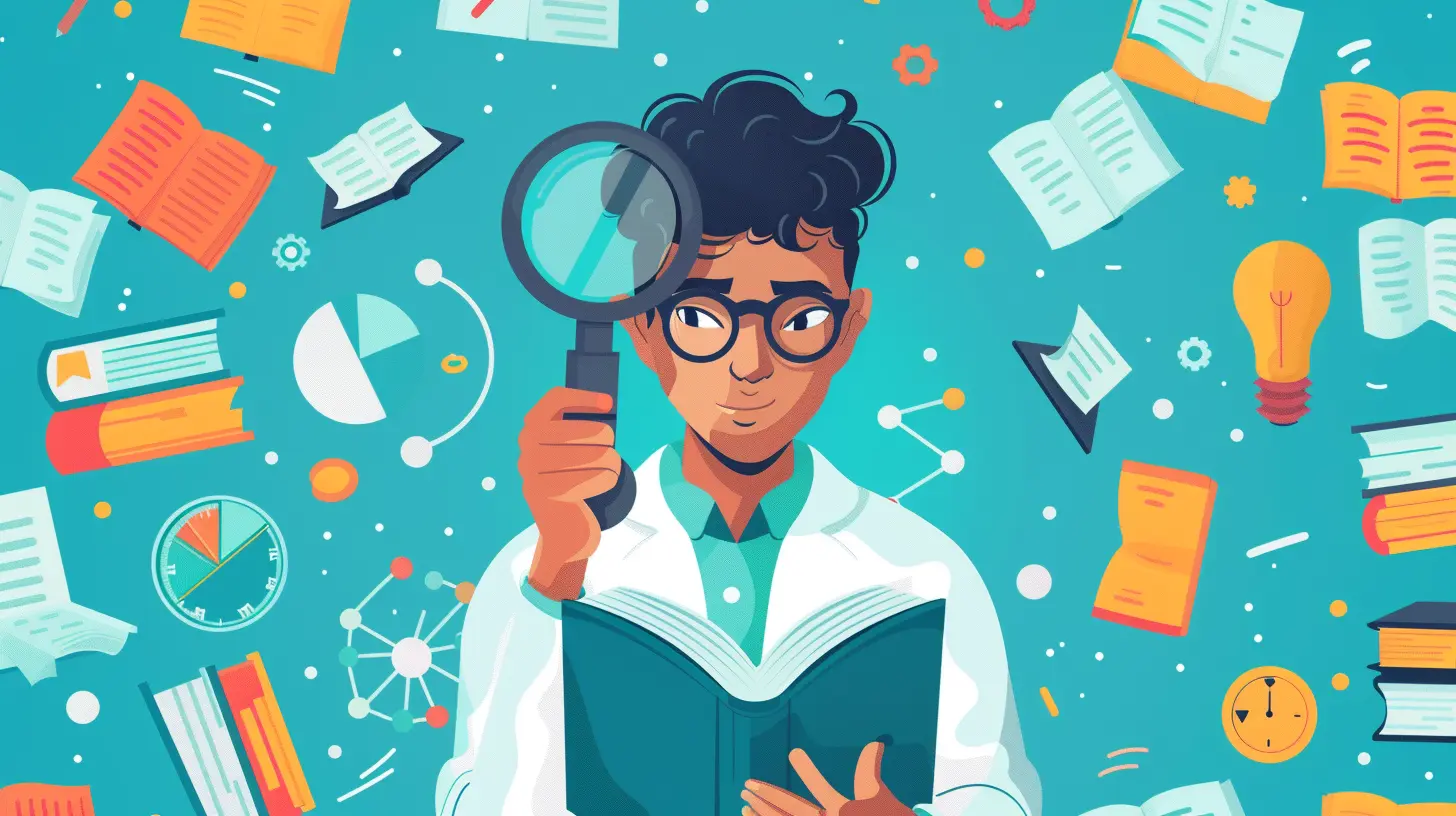Self-Assessment: A Key to Unlocking Autonomous Learning
4 October 2025
In today's fast-paced world, learning is no longer confined to the walls of a classroom. With the rise of online education and continuous skill development, more people are taking control of their own learning journeys. But how do you know if you're truly progressing? How can you ensure you're learning effectively? Enter: self-assessment.
Self-assessment is a game changer for anyone who wants to take charge of their education. It’s like having a personal GPS that helps you understand where you are, what you’ve learned, and where you should head next. It’s not just about checking off boxes but about reflecting on your understanding and growth. So, let’s deep dive into why self-assessment is the key to unlocking autonomous learning.

What Is Self-Assessment?
Before we get into the nitty-gritty of how self-assessment can transform your learning, let's first define what it is. Self-assessment is the process of evaluating your own learning and performance. Think of it as holding up a mirror to your brain and asking, “What have I learned? What areas do I still need to work on?”But it's not just about saying, “I got this,” or “I need to work harder.” It's about thoughtful reflection, measuring progress, and then using that insight to tweak and improve your learning strategy. It’s your personal feedback loop—kind of like an internal coach that guides you on what to focus on next.
The Main Components of Self-Assessment
1. Reflection: This is where you introspect and think about what you already understand and what still confuses you. What areas need improvement? What concepts are you comfortable with?2. Goal Setting: Once you’ve identified your growth areas, you can set specific, measurable goals. This keeps you on track and gives you something tangible to work towards.
3. Action Plan: Finally, based on your reflections and goals, you create a plan for improvement. This could be anything from diving deeper into a topic to practicing a skill regularly.

Why Is Self-Assessment Crucial for Autonomous Learning?
You might be wondering, “Why bother with self-assessment when I can just follow a teacher’s feedback or stick to a course syllabus?” Well, here's the deal: autonomous learning is all about taking initiative, and self-assessment is the tool that helps you navigate that journey.1. It Promotes Ownership of Learning
When you engage in self-assessment, you take the reins of your learning. Instead of waiting for someone to tell you what you’re doing right or wrong, you proactively evaluate your own performance. This cultivates a sense of responsibility and ownership, which is key to becoming an independent learner.An analogy? Think of it like driving a car. Would you rather wait for someone else to tell you when to turn or would you prefer to steer the wheel yourself? Self-assessment hands you the keys and lets you drive your education in the direction you want.
2. It Enhances Critical Thinking
Self-assessment isn't just about giving yourself a pat on the back or a slap on the wrist. It’s about digging deeper and understanding why you performed a certain way. It encourages you to ask questions like:- Why did I struggle with this concept?
- What could I have done differently?
- How can I improve next time?
This process sharpens your critical thinking skills, forcing you to analyze not only what you’re learning but how you’re learning. It’s like being both the player and the coach in a game of chess—strategizing every move and learning from each play.
3. It Builds Confidence
When you regularly assess your own learning, you develop a clearer picture of your strengths and weaknesses. Over time, this builds confidence because you know exactly where you stand. You’re no longer guessing whether you’ve mastered a topic or waiting for external validation. You know when you’ve nailed it and when you need to put in more work.Also, that sense of achievement you get when you’ve hit a learning goal? It’s incredibly motivating. It’s like checking off a to-do list—each tick mark gives you a little boost to keep going.
4. It Encourages Lifelong Learning
The beauty of self-assessment is that it's a skill you can use long after your formal education ends. Whether you're learning a new language, picking up a hobby, or developing a professional skill, self-assessment keeps you in check.Think of it as a compass guiding you through the vast ocean of knowledge. With self-assessment, you can always adjust your course, stay on track, and never stop growing.

How to Practice Effective Self-Assessment
Now that we've established the importance of self-assessment, the next question is: how do you actually do it? It's one thing to understand the theory, but another to put it into practice. Don’t worry, I’ve got you covered with some actionable steps to help you become a master of self-assessment.1. Set Clear Learning Goals
The first step is to know what you're aiming for. You can’t assess your progress if you don’t know what success looks like. Set specific, measurable, achievable, relevant, and time-bound (SMART) goals for your learning.For example, instead of saying, “I want to be better at math,” a more effective goal would be, “I want to master solving quadratic equations by the end of the month.”
2. Use Rubrics or Checklists
Sometimes, it’s hard to know how well you’re doing without some kind of framework. This is where rubrics or checklists come into play. These tools can help you break down a skill or concept into smaller, more manageable parts, making it easier to evaluate yourself.For instance, if you’re learning to write essays, you could create a checklist that includes criteria like “clear thesis statement,” “coherent structure,” and “strong conclusion.” After writing an essay, go through the checklist and see how well you’ve met each criterion.
3. Keep a Learning Journal
A learning journal is a great way to track your progress over time. After each study session, jot down what you learned, what you found challenging, and what you want to focus on next. This simple habit helps you reflect on your learning and identify patterns in your strengths and weaknesses.Plus, it’s incredibly satisfying to look back and see how far you've come. It’s like watching your personal highlight reel!
4. Seek External Feedback for Comparison
While self-assessment is all about internal reflection, it’s also helpful to get external feedback from time to time. This could be from a teacher, mentor, or even a peer. Compare their feedback with your own self-assessment to see if there are any gaps in your understanding. The goal isn’t to rely on external feedback, but to use it as a mirror to refine your self-evaluation skills.5. Regularly Adjust Your Learning Strategy
Self-assessment is only useful if you act on it. Once you’ve identified areas for improvement, adjust your learning strategy accordingly. This could mean dedicating more time to a particular topic, trying a different study method, or setting new goals.Remember, the aim is to continuously improve. Learning is a marathon, not a sprint, and self-assessment helps you pace yourself correctly.

Common Pitfalls of Self-Assessment (And How to Avoid Them)
Self-assessment is a powerful tool, but it can be tricky to master. Here are some common pitfalls that learners tend to encounter and how you can avoid them.1. Being Too Hard or Too Easy on Yourself
Some people are their own worst critics, while others tend to give themselves too much credit. Both extremes can hinder your learning progress. The key is to be honest and objective in your self-assessment. If you’re struggling to be impartial, try using a rubric or checklist, as mentioned earlier, to guide your evaluation.2. Focusing Only on Weaknesses
While it's important to identify areas for improvement, don’t forget to acknowledge your strengths. Celebrating your successes boosts motivation and keeps you moving forward. Remember, self-assessment is about balanced reflection—not just finding faults.3. Skipping the Reflection Process
Sometimes, it’s tempting to rush through self-assessment just to check it off your to-do list. But taking the time to truly reflect on your learning is where the magic happens. This is where you derive insights that help you grow. So, avoid the temptation to cut corners and make reflection a non-negotiable part of the process.Conclusion: The Key to Lifelong, Autonomous Learning
In a world where information is just a click away, the ability to learn independently is invaluable. Self-assessment is the key to unlocking autonomous learning because it empowers you to measure your progress, reflect on your growth, and adjust your strategies. It’s like having a compass that guides you through the maze of knowledge, ensuring you never lose your way.So, the next time you’re learning something new, don’t just rely on external feedback. Take a moment to pause, reflect, and ask yourself: “How am I doing?” You might be surprised at the insights you gain.
all images in this post were generated using AI tools
Category:
Self AssessmentAuthor:

Anita Harmon
Discussion
rate this article
1 comments
Penelope Morrow
This article effectively highlights the transformative power of self-assessment in fostering autonomous learning. By cultivating reflective practices, learners develop critical thinking skills and greater ownership of their educational journey, paving the way for lifelong learning and improved academic outcomes.
October 14, 2025 at 2:46 AM

Anita Harmon
Thank you for your insightful comment! I'm glad you found the article highlights the vital role of self-assessment in promoting autonomous learning and critical thinking. Your feedback is much appreciated!


